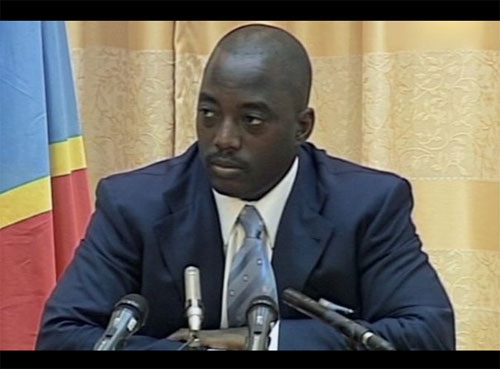Meurtre à Kinshasa - Qui a tué Laurent-Désiré Kabila ?
-
Réalisé par Marlène Rabaud, Arnaud Zajtman • Écrit par Marlène Rabaud, Arnaud Zajtman
-
France, Belgique • 2011 • 52 minutes • DV Cam • Couleur et Noir & Blanc
- Réalisation :
Marlène Rabaud, Arnaud Zajtman - Écriture :
Marlène Rabaud, Arnaud Zajtman - Image :
Marlène Rabaud - Son :
Gilles Laurent - Montage :
Sophie Vercruysse
- Production (structure) :
Entre chien et loup - Coproduction :
WIP - Wallonie Image Production - Diffuseur :
RTBF - Radio Télévision Belge Francophone - Participation :
Gouvernement Fédéral Belge - Ayant droit :
Entre chien et loup
- N° ISAN :
ISAN 0000-0002-B0C8-0000-2-0000-0000-V
Résumé
En fin de matinée, le 16 janvier 2001, Laurent Désiré Kabila est assassiné dans son bureau présidentiel par un ancien enfant-soldat devenu son garde du corps. Nous sommes au Congo (ex-Zaïre), où Kabila avait été porté au pouvoir quatre ans plus tôt grâce à son armée d’enfants-soldats, mettant ainsi fin au régime dictatorial de Mobutu. Quelques instants plus tard, l’assassin de Kabila est lui-même tué alors qu’il tente de fuir le lieu du crime. Sur son corps, on trouvera une missive signée de l'attaché militaire de l'Ambassade américaine de l'époque : "En cas de problème, contactez-moi". Bien d’autres pistes viendront entourer d’un brouillard épais cet assassinat toujours pas élucidé à ce jour. La Justice congolaise, elle, faute d'avoir réussi à arrêter les coupables, condamnera 135 innocents, militaires et civils, dont 50 croupissent toujours en prison. L'injustice de ce procès hallucinant constitue d’ailleurs le point de départ du film : en faisant passer une caméra cachée à l'un des condamnés dans la terrible prison de Makala, les réalisateurs ont recueilli un bouleversant témoignage et démarrent ainsi de manière saisissante ce documentaire d’investigation. Les interviews sont complétées par des images d'archives inédites de la guerre au Congo - que Kabila a mené contre son ancien allié, le Rwanda - et du procès militaire au cours duquel les ubuesques condamnations ont été prononcées. Le film nous offre une plongée époustouflante dans une région de l’Afrique qui est au cœur de combats sans merci pour le contrôle d’immenses ressources naturelles. Combats qui conduisent à des violences inouïes parmi ceux qui tentent d’en monopoliser l’exploitation
In the late morning of January 16th 2001, Laurent Desire Kabila, is murdered in his presidential office by a soldier-kid who had become his bodyguard. We are in the Congo (former Zaire), the very country where four years earlier Kabila had seized power thanks to his army of soldier-kids, putting an end to Mobutu’s dictatorial reign of several decades. A few minutes later, Kabila’s assassin is shot to death as he attempts to escape from the scene of his crime. Later, on his dead body a letter is found signed by the Military Attaché of the American Embassy: “Should there be a problem, call this number”. Many other trails will weave a thick curtain of mystery around this murder, which, to this day, has not yet been solved. Trails, such as the fate of eleven Lebanese citizens, linked to a diamond merchant suspected of having financed the President’s assassination, who are abducted in the Congolese capital and executed on the very evening of Kabila’s murder. This film is an in-depth investigation, centred on key actors – including the current President of Congo, Joseph Kabila, son of the victim – and eyewitnesses of the murder. The inquiry starts in the vastness of the Congolese territory and ends in the Arctic Circle, in Sweden, where the directors were able to locate the presumed accomplice of the murderer. As far as Congolese Justice is concerned, it has condemned, in a grotesque show trial, 135 innocent people, soldiers and civilians, 50 of them are still rotting in the country’s dreadful prisons. A hidden camera passed to one of the convicts in the prison of Makala reveals shattering testimonies, yet offers the gripping start of the investigation. Interviews, never been shown before archival footage of the show trial and of the war in Congo –a war that Kabila had launched against his former ally Rwanda- deliver a incisive insight into an African region that is at the heart of ruthless fights for the control of huge natural resources.
Collection
Mot(s)-clé(s) thématique(s)
Comment avoir accès au film ?
-
Édition DVD
- Il n'existe pas d'édition DVD à notre connaissance
-
Accès VOD
- Il n'existe pas d'accès en VOD à notre connaissance
- Diffusion non commerciale / Consultation


